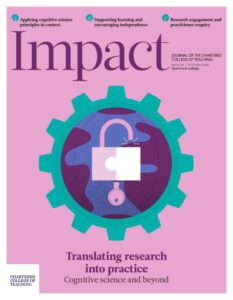Alexandra Morgan and Emmajane Milton, School of Social Sciences, Cardiff University, UK
There is an increasingly dominant narrative internationally that classroom practice should be research-informed and that teachers themselves benefit from being engaged in research-informed teacher enquiry (BERA/RSA, 2014). In this article, aimed at all educators, we suggest that care is needed when engaging in this form of professional learning to ensure that it is authentic, contextually specific, meaningful and sustained over time. When research-informed teacher enquiry is undertaken and supported well it can result in valuable and transformational professional learning – really ‘lifting the lid’ or ‘shining the light’ on practice. Alternatively, when it is not, it can be trivial, inauthentic and a waste of time.
Drawing on our experiences as teacher-educators working to support research-informed teacher enquiry projects and the development of an enquiry stance (Sachs, 2016), we outline nine principles for engaging in research-informed teacher enquiry as a meaningful process of professional learning. For each principle, we provide a rationale based on our experiences in practice supported by relevant literature.
Enquiry serves teaching and learning
Clarity about the main purpose of engaging in research-informed teacher enquiry is essential for teachers. When the assumptions that underpin why practitioners should engage in this are not made explicit and discussed, they typically vary and can lead to confusion and misunderstandings regarding what exactly teacher enquiry is and what it is aiming to do. Enquiry should first serve teaching and learning, and this means that at its core it is not about identifying, proving and replicating ‘what works’ in classrooms (Biesta, 2007, p. 1). Neither is it about teachers becoming educational researchers in an academic way (indeed, one definition of the word ‘academic’ is being of no practical use). Instead, it is focused on classroom practice, learner experience and, fundamentally, practitioners’ own professional learning. For that reason, it is practitioners themselves who should identify what the exact focus is of their enquiry. It is about seeking to understand through systematic forms of critical reflection (rather than proving something works). Research-informed teacher enquiry is most valuable when it provides opportunities to ask searching questions about practice in a way that allows teachers to develop this as a craft (Stenhouse, 1975).
Understanding and enacting enquiry as a stance
Enquiry as a stance is a way of thinking and being – a ‘habit of mind’ (Shulman, 2005 p. 59). It is about a commitment to questioning your own practices of teaching as a basis for professional learning, always seeking to better understand and being willing to challenge the status quo by asking questions such as:
- Why do we do it this way for our learners?
- Are any learners disadvantaged by these ways of working?
- How can we do it better?
- What can we do to understand more about this? (Cochran-Smith and Lytle, 2009)
Adopting an enquiry stance recognises the unique value of teachers and teacher knowledge, and challenges the idea that expert knowledge (academic knowledge) is more valuable while not dismissing the value of engaging with academic ideas (Schön, 1987). It privileges thinking not about ‘Will it work?’ but about ‘What can I learn?’. In terms of undertaking research-informed teacher enquiry, it means asking:
- How has engaging with this process helped me to see things differently?
- How will this impact on my practice and my learners?
Fundamentally, when undertaking research-informed teacher enquiry, teachers need to understand the challenge of the paradigm in which they are situated, acknowledging that they are working to change and improve both their practice and themselves as learners/practitioners. The process and the learning along the way are as, if not more, important than any final outcomes of an enquiry.
Establishing trust and honesty is crucial
Adopting an enquiry stance is a hard thing to do, and is best done as a collaborative endeavour, the value of it needs to be an integral part of a school’s culture. Regardless of an individual’s position in the school, it is a risky business to sensitively and honestly share what you really think about practice and learner experience. But without being honest and sharing what you really think, it is hard to clarify your own thinking and virtually impossible to know anything about the thinking of others. Trust needs to be built in order to create space where honest and risky talk for teachers is safe (Eraut, 2000). In many educational contexts this is not the norm and needs to be established, committed to and sustained. For educational leaders, it takes real courage to establish professional cultures that can support trust and honesty – essential for working in this way (Mockler, 2022).
Asking worthwhile questions takes time
Research-informed teacher enquiry seldom begins with a question but a focus – something unsettling, perplexing or really interesting. It is always located in the teacher’s own classroom practice, focused on learning and learners’ experiences of this. Working out exactly the right question takes time and refinement – most likely with others. Teachers need to be aware of the external policy and accountability pressures to which they are working and can unhelpfully influence the questions they ask so their research-informed teacher enquiry fails to be ‘disruptive’ (Daly et al., 2020, p. 341). Asking good questions through research-informed teacher enquiry is an important feature of learning in this way and good enquiry questions are refined through engaging with external ideas – with colleagues, learners, academic literature.
Avoiding easy answers
Research-informed teacher enquiry is not about proving that something you already do works, in a way that would suggest it could be rolled out to other contexts. This is because all contexts are so different, with unique students and unique teachers, learning together within a unique context – all shaped by ‘varied histories, understandings, beliefs, and perspectives on instruction and curriculum’ (Valencia et al., 2009 p. 304). Research-informed teacher enquiry is focused on developing deeper and more critical understandings – lifting the stone and looking underneath – and it takes bravery and the ability to be honest with yourself. It tends to illuminate how complex things are – it is messy and often not linear.
Taking time to genuinely listen to learners
Genuinely listening to learners and seeking to understand their experiences can usefully guide research-informed teacher enquiry. It can also help teachers to move beyond, the easy (but unhelpful), idea that where the quality of work or levels of engagement and attainment are below what they might want or expect, the problem automatically rests almost solely with the learner themselves (Pearl, 1997). This way of working is best viewed as an ongoing conversation that moves beyond superficial compliance in terms of learner voice (Rudduck and Fielding, 2006). In seeking learners’ views, there needs to be a real commitment to take contingent action and change, as without this, it can be a waste of learners’ time and construed as disingenuous and unethical (Morgan and Milton, 2022).
Doing no harm
Teachers are always considering whether their everyday practice is ethical, but undertaking research-informed teacher enquiry demands that research ethics (BERA, 2018) are also considered. Key ethical issues might include: gaining parental consent, student assent, anonymity and confidentiality, appropriateness of data-collection approaches, data storage (where and how long for), access to the data and how findings will be shared.
Engaging with well-chosen literature
While adopting an enquiry stance means recognising the unique value of teachers and their knowledge of practice, it also means acknowledging that key ideas from academic literature are useful in critically reflecting on practice. This is because drawing on pertinent and carefully selected academic literature can support thinking and help to illuminate an enquiry focus more deeply and/or from a different viewpoint (Rolfe, 2002). Teachers can locate literature themselves in places such as the journal Impact and by using Google Scholar. However, we feel this has been best achieved by us, serving up (like a waitressing service) pertinent literature for the teachers with whom we work, working with them to understand what literature they need and then providing it. This is key in saving teachers time for the main event – engaging with literature – to support them in thinking deeply and critically about their practice.
Acknowledging enquiry can be unsettling and empowering
When teachers commit to working in this way to change things for the better, it is almost always a disruptive and unsettling experience, as it challenges the status quo. Realising that aspects of existing practice are not as you would want them to be can be challenging work, because as teachers we care about learners and are emotionally invested in our ways of working. It is helpful for teachers to know this in advance to prepare them to be more comfortable with feeling uncomfortable, which is not an easy thing to do and takes carefully considered support. You need good colleagues who ask you awkward, difficult and unsettling questions because they care about you as a professional and about your learners.
Conclusion
All things labelled as being teacher enquiry are not the same. Given the limited understanding of how this and developing an enquiry stance can be best supported (Lawton-Sticklor and Bodamer, 2016), there seems to be much that requires further discussion and debate. Without engagement in this, there is a danger that research-informed teacher enquiry can become an instrumental, step-by-step, tick-box activity that teachers experience in a more transmissive than transformative way (Kennedy, 2005). It is hoped that the principles outlined in this article provoke dialogue about what support teachers need in order to engage with research-informed teacher enquiry in a way that is meaningful and worthwhile.











